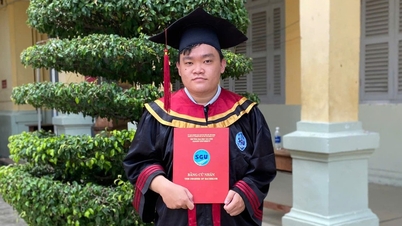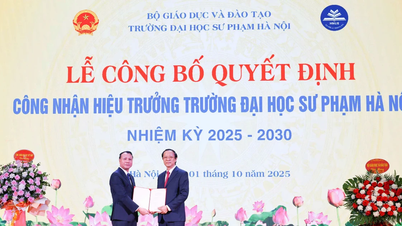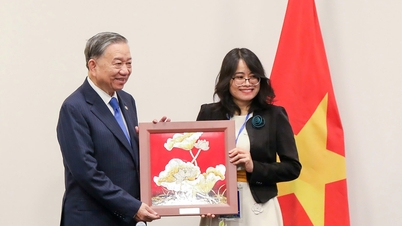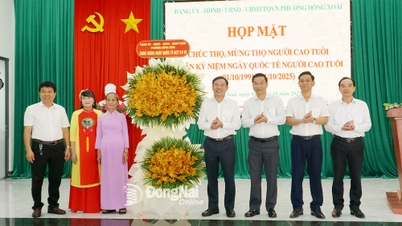
Students of National Economics University receive their diplomas - Photo: NEU
Speaking to Tuoi Tre reporter, Dr. Le Anh Duc - head of NEU training management department - said that unlike teaching English simply as a foreign language, NEU's project aims to develop English as an official language used in the university environment, meaning it is used not only in the classroom, but also in academic activities, research and university administration.
From the demands of the labor market
* Sir, how has English been used at NEU in recent years? What is the current ratio of English and Vietnamese training programs?
- NEU has many favorable conditions to implement and develop the project of Making English the second language in schools. In particular, since 2012, NEU has proactively built and applied a system of output standards for full-time university students, considering this as one of the key criteria to improve training quality and ensure integration ability after graduation.
As of 2024, NEU has 25 undergraduate training programs in English, and it is forecasted that in the 2025-2030 period, it will develop to 35 programs, accounting for 65% of the total number of training programs.
Notably, by 2024, approximately 75% of students admitted to NEU will have met the English output standards from the beginning. However, there are still significant challenges as a number of students, especially those in Vietnamese-taught majors, have not met the standards on schedule, requiring increased support and adjustments to teaching methods during the training process.
* So, what factors led NEU to decide to make English the main language in the university, sir?
- The urgency of implementing the project comes from three factors.
Firstly, the global labor market requires high levels of foreign language skills, especially in the fields of economics and management. When students have good English proficiency in their studies and research, their employment opportunities and career advancement will be expanded.
Second, the international academic integration capacity of lecturers and students needs to be enhanced through a bilingual academic environment.
Third, the strategy of developing a regional-class university, towards a research university - deep integration, requires a strong and stable academic language foundation.
3-phase deployment
* Could you tell us how NEU will realize the goal of using English in both academics, research and administration?
- According to the project, NEU will implement it in 3 phases. In 2025, conduct a survey, issue an assessment tool, and train staff; in 2026 - 2027, pilot the use of English in a number of subjects and administrative units; organize specialized language skills training; from 2028 onwards, expand it across the entire school, integrate English into academic processes, administrative services, tables, forms, and e-office systems. The use of English will be accompanied by technology support, personalized training, and periodic quality monitoring.
In order for English to gradually become a second language alongside Vietnamese - that is, commonly used in teaching, research, academic and extracurricular exchanges, NEU aims for 100% of training programs to have at least 30% of subjects taught in English from 2028; learners must meet the minimum English output standard of B2 or equivalent (IELTS 6.0) by 2030.
* One of the notable points of the project is to include English in administrative documents in schools. Can you share more about this point?
- NEU will develop regulations to encourage the use of English in administrative documents, internal announcements, and signs at units, especially at international training units or those with many students studying the EMI program.
The core objective is to standardize the international working environment, helping staff to communicate and work with foreign partners, and process international student records. At the same time, access international documents, standards and quality systems.
NEU does not impose it immediately, but the 2025 - 2030 roadmap will be implemented in groups of units and departments, with specialized English training programs for administrative staff, especially groups working with international students, communications, testing, training...
Along with that are AI applications that support self-learning such as chatbots and bilingual automatic email responses, helping the capacity improvement process take place smoothly and practically.
Creating an environment for students
* When applying English, one of the obstacles is that the lecturers are not competent in English. How will this be solved?
- The project does not "assimilate" the entire team but designs a stratification mechanism - roadmap. Accordingly, lecturers with good English skills will be given priority to train in EMI teaching methods, supported with learning materials, and have their standard hours reduced.
For those lecturers who are not ready, they will be placed on a 2-3 year roadmap with training courses on specialized vocabulary and academic presentation skills in English. Most importantly, NEU does not require sudden changes, but creates a mechanism of encouragement - support - recognition.
* One of the goals of the project is for students to achieve the output standard of 6.0 IELTS by 2030. On what basis does the school set this standard and how does the school encourage students to improve their English skills?
- IELTS 6.0 by 2030 is a reasonable target, because currently 75% of students admitted to NEU have achieved B1 standard or higher, many of them already have IELTS 5.5 - 6.5.
When students are admitted to the school, NEU has a 4-stage roadmap, including: entrance examination - suitable class placement; basic academic English training - specialized; standardized final exam preparation; financial support for disadvantaged students through IELTS scholarships, tuition exemption for supplementary classes.
To encourage the formation of habits and culture of using English in daily communication, NEU will establish "English Zone", areas that encourage English communication such as libraries and open spaces.
At the same time, organize English forums, clubs, competitions, and industry-specific seminars for students. Apply AI chatbots, 24/7 virtual academic assistants to help students practice reflexes, ask questions, simulate career situations...
* How are learning resources and facilities for English training prepared?
- At NEU, the English digital learning materials library has been updated and linked to international data repositories such as ProQuest, Scopus, ScienceDirect...; digital learning materials and internal learning materials will be developed bilingually.
In terms of facilities, NEU has built EMI classrooms, language rooms, an integrated English LMS platform; invested in academic chatbots, AI tutors, speaking practice systems...
Many universities at home and abroad apply
In Vietnam, some universities have pioneered the use of English as the main language of instruction and operate as international universities, including RMIT University Vietnam, British University Vietnam, Vin Uni; some private universities implement comprehensive teaching and learning in English according to the international cooperation model, such as Fulbright University Vietnam, International University - Ho Chi Minh National University, Vietnam - Germany University, Hanoi University of Science and Technology...
In the Asian region, many countries have used English as an official language in university education , even in countries where English is not the mother tongue, such as Singapore (all public universities such as NUS, NTU), Japan (universities such as Akita International University and Ritsumeikan APU)...
The natural part of academic life
* In your opinion, what is the most important factor for the project to be successfully implemented?
- It is the determination of the teaching staff and the transformation of thinking throughout the system. When English is no longer a "subject" but becomes a natural part of academic life, we will truly enter the global university culture.
This project is not only a linguistic goal, but also a strategy to change the university model - from teaching and learning to connection and integration.
Source: https://tuoitre.vn/dua-tieng-anh-thanh-ngon-ngu-chinh-o-dai-hoc-20250809223920604.htm



![[Photo] Hanoi morning of October 1: Prolonged flooding, people wade to work](https://vphoto.vietnam.vn/thumb/1200x675/vietnam/resource/IMAGE/2025/10/1/189be28938e3493fa26b2938efa2059e)


































![[Photo] The 1st Congress of Phu Tho Provincial Party Committee, term 2025-2030](https://vphoto.vietnam.vn/thumb/1200x675/vietnam/resource/IMAGE/2025/9/30/1507da06216649bba8a1ce6251816820)
![[Photo] Panorama of the cable-stayed bridge, the final bottleneck of the Ben Luc-Long Thanh expressway](https://vphoto.vietnam.vn/thumb/1200x675/vietnam/resource/IMAGE/2025/9/30/391fdf21025541d6b2f092e49a17243f)
![[Photo] President Luong Cuong receives President of the Cuban National Assembly Esteban Lazo Hernandez](https://vphoto.vietnam.vn/thumb/1200x675/vietnam/resource/IMAGE/2025/9/30/4d38932911c24f6ea1936252bd5427fa)
























































Comment (0)